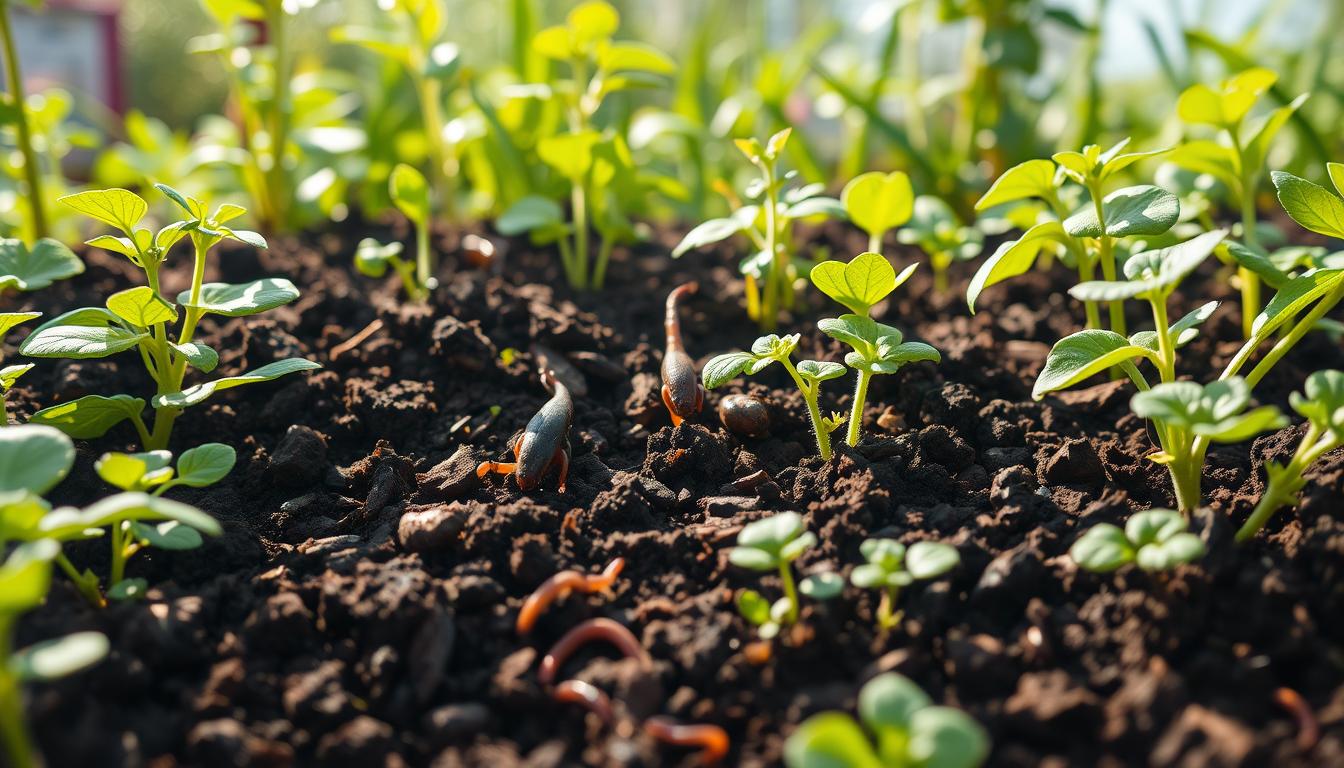I’ve always been amazed by how organic fertilizers can turn my garden into a lush oasis. As a gardener, I’ve seen the magic of natural fertilizers firsthand. They make my soil better and help my plants grow strong.
Organic fertilizers have changed my garden for the better. I’m eager to share what I’ve learned with you. With the right mix of natural fertilizers, you can make your plants thrive.
What Are Organic Fertilizers and Why Use Them?
Exploring organic fertilizers is exciting. They come from natural sources like animal waste and plant residues. These fertilizers slowly release nutrients, helping plants grow and soil health.
Using organic fertilizers improves my garden’s health and the environment. They help avoid pollution and soil damage. This makes gardening better for our planet.
Understanding Organic Fertilizers
Organic fertilizers work well with nature. They slowly release nutrients as they break down. This supports healthy soil microbes, key for plant growth.
Nutrient Sources for Organic Options
Common organic fertilizers include:
- Composted manure
- Plant residues
- Microorganisms
These sources give plants the nutrients they need, like nitrogen and potassium.
Benefits for My Garden
Organic fertilizers bring many benefits to my garden, such as:
- Soil gets better structure and fertility
- Plants grow more and yield more
- They’re better for the environment
These advantages make organic fertilizers a great choice for sustainable gardening.
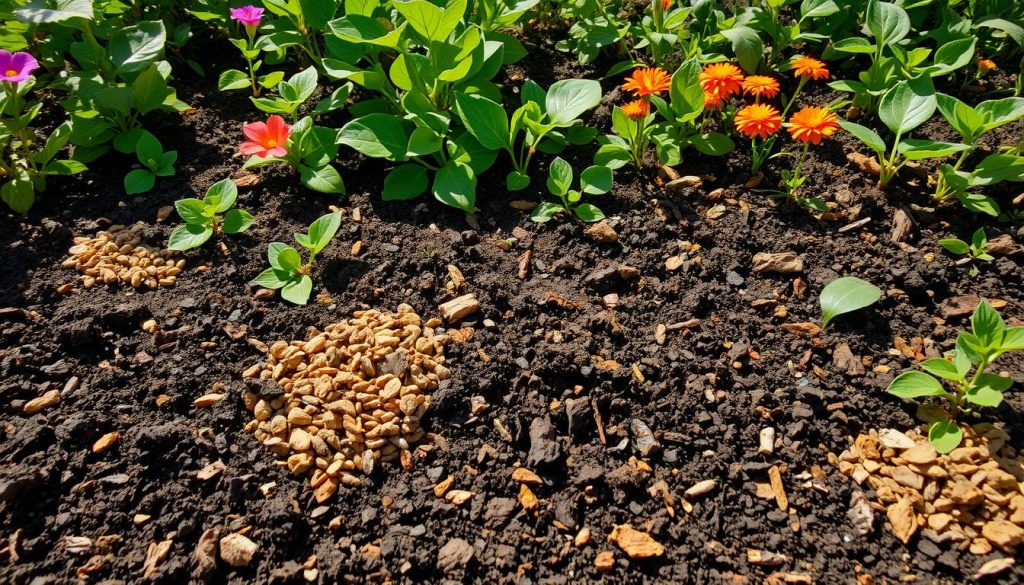
How Organic Fertilizers Differ from Synthetic Options
Exploring organic gardening, I’ve learned the importance of the right fertilizers. Synthetic fertilizers might seem quick fixes but harm the environment and human health. Organic fertilizers, however, are sustainable and eco-friendly, reducing pollution risks.
Organic fertilizers are a chemical-free option for gardeners. They promote healthy plant growth without harming the environment. This is crucial for those avoiding harsh chemicals.
Comparing Composition and Nutrient Release
Organic fertilizers come from natural sources like compost and manure. They release nutrients slowly, feeding plants steadily. Synthetic fertilizers, made from chemicals, release nutrients fast but harm soil and water.
Environmental Impact Considerations
Organic fertilizers have a clear environmental advantage. They lower risks of soil and water pollution, and climate change. Here are their benefits:
- Reduced soil erosion
- Improved soil structure
- Increased biodiversity
- Lower carbon footprint
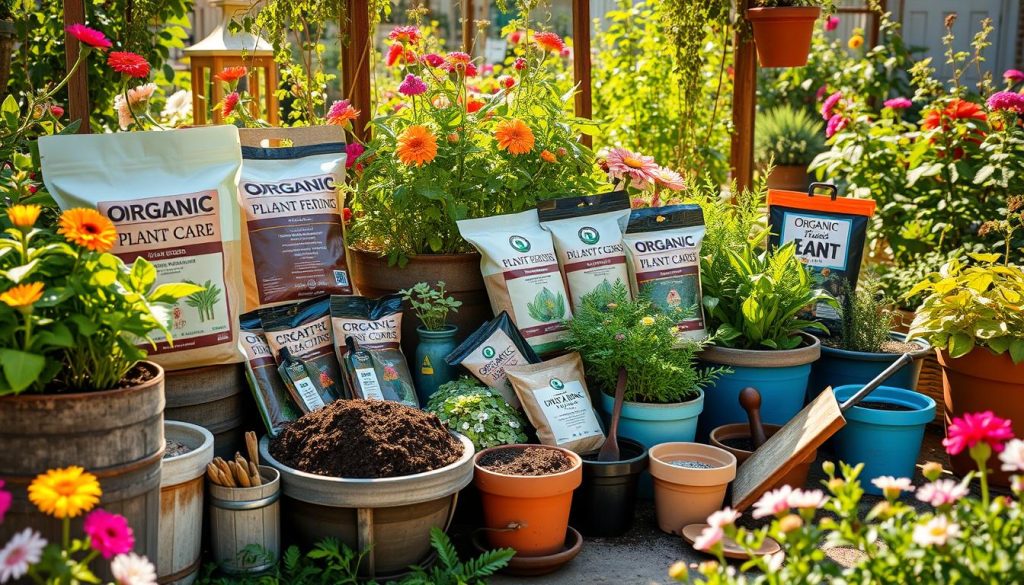
My Favorite Organic Fertilizer Types
Exploring organic gardening supplies has shown me the variety of natural fertilizers. It’s hard to pick the best ones. But, some stand out for their effectiveness and simplicity.
Here are some of my favorite organic fertilizer types:
- Composted manure: rich in nutrients and microorganisms, it’s an excellent addition to any garden bed.
- Bone meal: a slow-release fertilizer that promotes healthy root development and overall plant growth.
- Fish emulsion: a liquid fertilizer that provides a quick nutrient boost, perfect for plants that need a little extra care.
These organic fertilizers are key in my gardening routine. They’ve made a big difference in my plants’ health and growth. Using them in my soil has helped create a thriving garden that’s good for my plants and the environment.
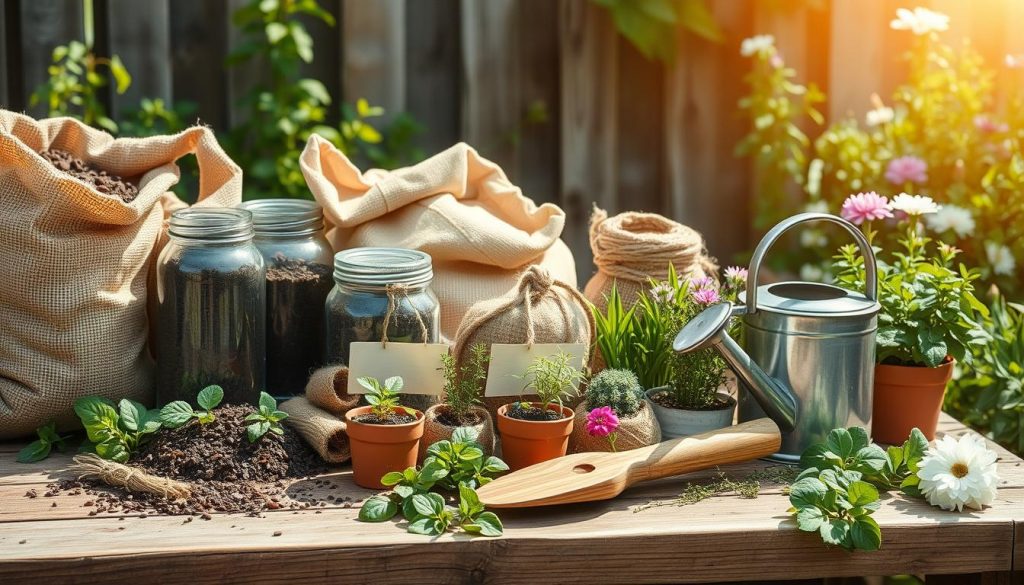
Choosing the right organic fertilizer depends on your plants and soil’s needs. By picking the right natural fertilizers and using them with other organic supplies, you can have a balanced and sustainable garden. This approach leads to great results.
How to Choose the Right Organic Fertilizer
Choosing the right organic fertilizer can be tough, especially for beginners. There are many options, and it’s key to know your soil and plants’ needs. By looking at soil type, pH, and nutrient gaps, you can pick the best organic fertilizers. This ensures your plants grow well and your soil stays healthy.
To start, think about these factors:
- Soil type: Different soils need different things, so pick an organic fertilizer that fits your soil.
- pH level: Most plants like a slightly acidic to neutral soil pH. Choose an organic fertilizer that keeps the pH right.
- Nutrient deficiencies: Find out what nutrients your soil lacks. Then, pick an organic fertilizer that fills those gaps.
Assessing My Soil Needs
Knowing what your soil needs is key to picking the right organic fertilizer. You can test your soil to find out about nutrient gaps and pH issues. With the test results, you can pick an organic fertilizer that gives your plants the nutrients they need for healthy growth.
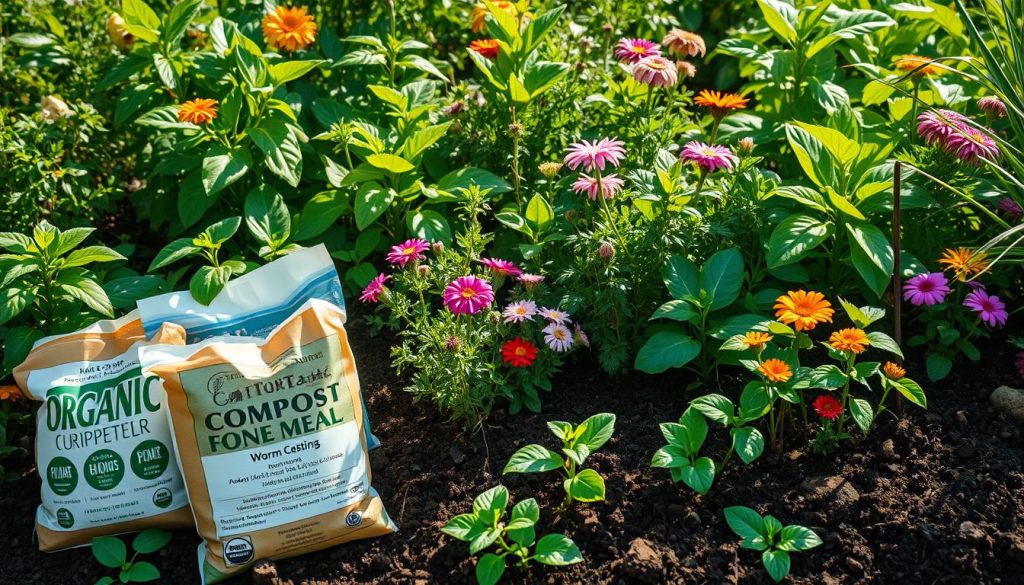
Understanding Plant Requirements
It’s also important to know what your plants need. Different plants have different needs, so choose an organic fertilizer that meets those needs. For example, some plants need more nitrogen, while others need more phosphorus. By picking the right organic fertilizer, you can make sure your plants get the nutrients they need for healthy growth.
When to Apply Organic Fertilizers
Exploring organic fertilizers, I’ve learned timing is key. Applying these natural enhancers at the right time gives my plants the nutrients they need. This ensures they grow and develop well.
In spring, I boost my plants with organic fertilizers. This helps them bounce back from winter and get ready for growth. Some top choices for spring include:
- Composted manure
- Fish emulsion
- Bone meal
Springtime Boosting
In spring, I fertilize my plants once a month. This keeps them nourished. I follow the label and start small to avoid harming the roots.
Feeding Throughout the Growing Season
As the season goes on, I keep feeding my plants. I mix organic soil amendments and growth enhancers for a balanced diet. This has greatly improved my plants’ health and output.
Here’s how I fertilize throughout the season:
| Month | Organic Fertilizer | Application Rate |
|---|---|---|
| April | Composted manure | 1 cup per 10 square feet |
| May | Fish emulsion | 1 tablespoon per gallon of water |
| June | Bone meal | 1 cup per 10 square feet |
Application Methods for Organic Fertilizers
Choosing the right way to apply organic fertilizers is key. It’s about using eco-friendly nutrients to care for your garden. Let’s look at the best ways to apply these fertilizers, like granular vs. liquid, and top-dressing vs. soil incorporation.
Granular vs. Liquid Application
Deciding between granular or liquid fertilizers is a big choice. Granular fertilizers, like composted manure, slowly release nutrients into the soil. Liquid fertilizers, like fish emulsion, quickly give plants a nutrient boost. The best choice depends on your plants’ needs and the fertilizer type.
Top-Dressing and Soil Incorporation
It’s also important to think about how you apply the fertilizer. Top-dressing adds a thin layer to the soil surface. Soil incorporation mixes the fertilizer into the soil. Incorporation can reduce waste and ensure even nutrient distribution. Using eco-friendly nutrients and the right application method helps your garden grow healthily and sustainably.
Making My Own Organic Fertilizers
I’ve found joy in making my own organic fertilizers. It’s part of my journey to sustainable gardening. I use organic supplies to make fertilizers that fit my needs. This way, I avoid commercial products.
I make natural fertilizers through DIY composting and compost tea. It’s easy and effective. I start with basic materials like food scraps, leaves, and grass clippings.
These materials help create a compost that’s full of nutrients. Using organic fertilizers has many benefits. They improve soil, increase plant health, and reduce waste.
DIY Composting Basics
Composting is simple and effective. It turns food scraps, leaves, and grass into a nutrient-rich compost. To start, I choose a composting method, like a bin or pile.
Then, I add materials in the right amounts. This creates a compost that helps my plants grow well.
Brewing My Own Compost Tea
Compost tea is a liquid fertilizer made by steeping compost in water. It’s a great way to give plants a nutrient boost. To make it, I add compost to a bucket of water and let it steep.
After several hours, the liquid is ready. I use it as a fertilizer. It provides plants with the nutrients they need to thrive.
Common Myths About Organic Fertilizers
Exploring organic fertilizers for plants, I’ve found many gardeners have wrong ideas. They think organic fertilizers are weaker than synthetic ones. But, organic fertilizers are actually better. They give plants nutrients slowly, helping soil and plants grow well.
Some people also believe organic fertilizers smell bad. It’s true, some can have a strong smell. But, there are many odor-free or lightly scented options. So, you can get the good stuff without bad smells.
- They are more expensive than synthetic fertilizers
- They are less effective than synthetic fertilizers
- They are difficult to apply
But, organic fertilizers are actually a smart choice. They help plants grow well and support green farming. Knowing the truth can help you pick the best for your garden.
Troubleshooting: Signs of Nutrient Deficiency
As a gardener, I’ve faced many nutrient deficiencies. These can lead to stunted growth, yellow leaves, and lower yields. It’s key to spot these signs and use organic soil amendments and plant growth enhancers to fix them.
Organic soil amendments like compost or manure add vital nutrients to the soil. This helps plants grow well. Plant growth enhancers, such as fish emulsion or bone meal, also provide nutrients. They help fix common nutrient deficiencies.
Recognizing Nutrient Deficiency Symptoms
To spot nutrient deficiencies, I look for yellow leaves, stunted growth, or less fruit. Here are some common signs:
- Yellowing leaves: This often means a lack of nitrogen. Adding compost or manure can help.
- Stunted growth: This could mean a phosphorus shortage. Bone meal can fix this.
- Poor fruit production: This might point to a potassium issue. Kelp meal can help with this.
Remedies for Common Deficiencies
When I find a nutrient deficiency, I know how to fix it. For nitrogen issues, I add compost or manure. For phosphorus problems, bone meal is the solution.
Tips for Maintaining Soil Health
Keeping your garden soil healthy is key to a thriving garden. Eco-friendly plant nutrients play a big role. By following a few easy steps, you can make your soil strong and support your plants well.
Crop rotation is a smart way to keep soil healthy. It means changing what plants grow in a spot to avoid nutrient loss. This method also fights soil erosion and boosts soil fertility. Plus, using natural plant feed encourages good soil microbes, creating a balanced ecosystem.
Here are more tips for a healthy soil:
- Mulching keeps moisture in and weeds out
- Adding compost or manure improves soil texture
- Planting cover crops protects the soil and adds nutrients
By using these tips and eco-friendly nutrients, your garden will flourish. It will need less chemical fertilizers and pesticides. This is good for the planet and supports a greener gardening way.
| Soil Health Tips | Benefits |
|---|---|
| Crop Rotation | Reduces soil erosion, increases fertility |
| Mulching | Retains moisture, suppresses weeds |
| Organic Matter | Improves soil structure, promotes microbial activity |
The Future of Organic Fertilizers
The gardening world is always changing, with new ideas and trends in
organic gardening supplies
. People are looking for better
natural plant fertilizers
to feed our gardens.
Innovations in Organic Practices
One big change is using advanced microbial inoculants and biostimulants. These products use good bacteria and fungi to help plants absorb nutrients better. They also make the soil healthier and plants stronger.
Trends I’m Excited About
Regenerative agriculture is another trend I love. It aims to improve soil health and biodiversity. This can make our fertilizers better and more effective.
The future of
organic gardening supplies
looks great, with new ways to make
natural plant fertilizers
and
sustainable plant nutrition
options. By keeping up with these changes, I can keep my garden healthy and thriving.

